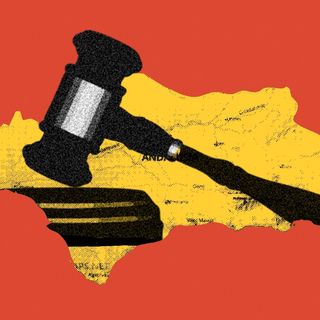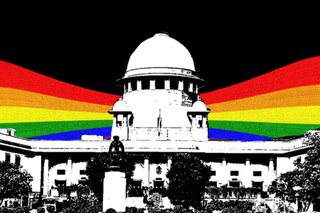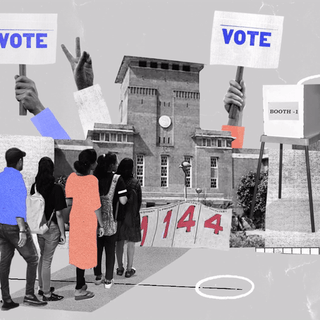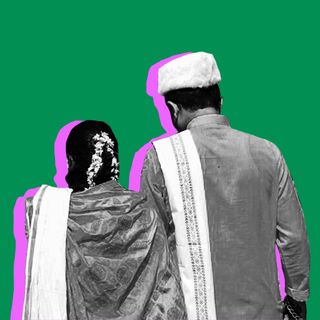
The Marriage Equality Hearings Week 3: Is Marriage a Fundamental Right?
On The Swaddle’s behalf, Hetvi Kamdar sat in on week 3’s hearings and asked petitioner Utkarsh Saxena a few questions about the salient points.

The ongoing Supreme Court hearings on marriage equality petitions mark the first significant case in the Indian judiciary that’s being live-streamed to the nation. With all eyes on the outcome of the case, on behalf of The Swaddle, Hetvi Kamdar sat in on week 3’s hearings and asked petitioner Utkarsh Saxena, who is also a lawyer on this case, a few questions about the salient points.
The third week of the marriage equality petitions were also accompanied by protests by the VHP (Vishwa Hindu Parishad). The crux of this protest lies in the Hindu Marriage Act of 1954. “Nationwide protests will be held against the plea in the Supreme Court. This plea is against the ethics of Sanatani beliefs,” said VHP Tripura chief Mahendrapal Singh, according to a Statesman report. Tripura’s Agartala witnessed the first of these protests on 1st May, and the VHP are expected to organize more of these against the Supreme Court hearings. According to the organization, the apex court should have consulted religious leaders and authorities in various disciplines before making such a decision.
The VHP has submitted memorandums to their district magistrates on the grounds that legalizing same-sex marriage would destroy the social fabric and sanctity of this institution. The hearings deliberating on whether marriage is a fundamental right for all, then, become important against this backdrop.
TS: The hearings held on 3rd May raised a question on whether marriage is a fundamental right – what are your views on this? Is this what the case boils down to?
Utkarsh Saxena: So the argument of the petitioners is that the right to choose a partner of your choice is a fundamental right. The current legal institution under which this choice is exercised is marriage, and therefore it should be extended to marriage as well. The case, I don’t think, boils down to that. I don’t think there’s a lot of dispute about whether it’s a fundamental right or not. I think it’s much more about how do you ensure that the statutes are harmonized with the Constitution, and how all the complications that arise with statutory interpretation are sorted out while extending this right to all members of society. I think that’s the crux of the matter right now.
TS: A committee headed by the Cabinet Secretary is being formed to address the human concerns of same-sex couples, without the legal recognition of the same as a marriage – is this a step in the right direction, and what rights do you think will be left out due to the lack of legal recognition here?
Utkarsh Saxena: So I think it’s very important to clarify that the court is not using this as an alternative to the hearings. It’s just a supplementary path and process that’s been initiated. Whether the petitioners have a valid claim to marriage under the Special Marriage Act continues uninterrupted. That hearing will proceed, and that constitutional litigation will continue. It’s just that there are some provisions in the executive notifications, in circulars, in executive orders of the government that don’t require parliamentary approval, that are also obstructive to same-sex couples to access certain rights. And the court is just exploring options about whether what they’re calling these ‘low-hanging fruits’ can be accessed by these communities without it going to Parliament, or without the court intervening. So that’s just sort of a side process that’s been initiated. It does not affect the overall litigation. It doesn’t mean that marriage is not up for grabs. It doesn’t mean that the petitioner’s claim has been diluted. Not at all. I’ve seen some of these observations in the media and that’s not accurate. In fact, the bench repeatedly clarified that this litigation continues. Because the government is saying that they’re actually keen to support families in some ways, we are just exploring ways that can be done, especially for those rights that don’t require the involvement of the parliament or the constitutional court.
TS: Even with the rights and entitlements recognized under the ambit of marriage, will certain other protections — such as against domestic violence — still be elusive for queer couples?
Utkarsh Saxena: So this litigation is only about the Special Marriage Act and related rights. As far as the rights of women under the Domestic Violence Act are concerned, they will not be affected, and those are not exclusions of the queer couples right now that are being challenged. So they will not be affected, but you’re right. All the other rights that queer couples could access but are currently not a part of because these legislations by design are heteronormative, will not be dealt with in this litigation, and which is why this marriage litigation is so important, because it’s only once you establish the right to marriage as a prerequisite to all these other rights can queer couples really access them. So this is just stage one, where the right to marriage is under challenge. If you’re successful here, then maybe there will be opportunities in future litigation for other allied rights, as you said, for example, in domestic violence, to be pursued, but not in the current case.
TS: There was some discussion during the last hearing regarding the dignity of heterosexual marriages and the use of the term ‘spouse’ diminishing the meaning that the terms ‘husband’ and ‘wife’ hold. What are your views on this?
Utkarsh Saxena: Well, firstly, the claim of the petitioners is not to substitute the word husband or wife with spouse, and eliminate them entirely . I think that’s a misunderstanding by those opposing our petitions. Our argument is that it could become husband, or wife, or spouse. So as to ensure that there are gender neutral terms in the statute. But secondly, and I think the bench also responded to this with a little bit of surprise, it’s surprising that this is such an important argument because it is a lot about names and labels, and your right to call your partners whatever you wish to, is not being curtailed. This is just about making a law that’s more inclusive. And if the path to inclusivity and generalization means that you have to take away some gendered words, so be it. For example, a lot of times when the feminist movement was happening and women’s rights were to be included, there were arguments made that a lot of statutes where it says ‘he’ or where it says, you know, ‘man’ should be interpreted in a gender neutral way. It’s understood that this is a very standard legal device where you try to tend to a level of abstraction that just makes the whole process more inclusive. It’s an argument, it will be dealt with, but I don’t think it’s a very convincing one.
Hetvi is an enthusiast of pop culture and all things literary. Her writing is at the convergence of gender, economics, technology and cultural criticism. You can find her at @hetviii.k.
Related


JNU, DU Haven’t Had Student Elections in Three Years. This Could Change a Generation of Students’ Political Worldview
